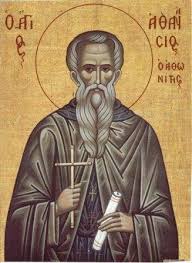Athanasius of Athos

Atanase Atoneli (Athanasius of Mt. Athos), formerly Abraham (approx. 925/930, Trabzon – approx. 1000, Mt. Athos, Greece), was a Byzantine clergyman who was named the Patriarch of Athos.
Atanase Atoneli, with the help of Nikephoros II Phokas, with whom he had a close friendship, essentially became a founder of the monastic “Republic” of Mount Athos. In 963, he built the first lavra (laura) and international monastery on Athos. Along with the Greeks, the Big Lavra housed Georgian monks as well: Ioane Atoneli (John the Iberian), his son Ekvtime Mtatsmindeli (Euthymius the Athonite) and Ioane -Tornike (Eristavi). They lived in Atanase Atoneli ‘s Big Larva until 980, when “on the advice of Father Atanase,” they built their own monastery of Iviron on Mount Athos. To this day, among the ktetors (ktitors) of the monastery of Iviron, Atanase Atoneli is mentioned first. Historical and literary sources underline Atanase Atoneli’s kindness and predisposition towards Georgian monks and the monastery of Iviron. According to the last will of Atanase Atoneli, Ioane Atoneli (John the Iberian) and Ekvtime Mtatsmindeli (Euthymius the Athonite) were named as spiritual leaders of the Big Larva i. e. the whole brotherhood of the Mt. Athos. His sympathy towards Georgian monks could be explained by the fact that his mother was Colchian (this is according to some of the oldest Greek manuscripts). During the main holidays of Atanase Atoneli’s Big Larva and the monastery of Iviron, the abbots of these havens would exchange their ecclesiastic functions during the sermons and other holy rituals. On the numerous frescos of monasteries of Athos there are depictions of Atanase Atoneli as a founder of the havens on Athos. Usually, in these frescos Euthymius the Athonite is depicted alongside Atanase. Atanase Atoneli fell from one of the scaffoldings of the main church (Katholikon or Catholicon) that he built and passed away. According to the Georgian and Greek liturgical calendars, the 5th of July is the memorial day of Atanase Atoneli. Euthymius the Athonite translated Life of the Great Atanase, which might have been about Atanase Atoneli, however, this text was lost.
A. Mikaberidze


